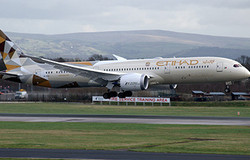
Fish farm fuels first commercial flight
Edited by: Mohamed Shihab
The world’s first commercial flight using a sustainable biofuel originating from a fish farm has been confirmed by the Sustainable Bioenergy Research Consortium (SBRC).
A non-profit entity established by Masdar Institute (part of Khalifa University of Science and Technology), SBRC said the Etihad Airways Boeing 787 flight from Abu Dhabi to Amsterdam marked a major milestone in the development of a clean, alternative aviation fuel to reduce carbon emissions. It also highlighted that the initiative addresses food security in the United Arab Emirates, with seafood farming providing a core element of the process.
The SBRC partners have been working together to prove the concept of a comprehensive value chain that is centered around the Seawater Energy and Agriculture System (SEAS). This is an industrial platform that supports the aviation sector, the oil and gas industry, food production, and the creation of a new agricultural alternative in the United Arab Emirates.
U.A.E. Minister of State for Food Security Mariam bint Mohammed Saeed Hareb Al Mheiri said this proof of concept was a groundbreaking development that addresses the challenges of energy, water, and food security.
“What is particularly exciting about the SEAS is that it is an initiative that supports multiple platforms; aviation, oil and gas and agriculture,” she said. “It is an important specialized initiative under the aquaculture umbrella, with the UAE recognizing that this sector represents one of the best uses of what is the region’s most precious resource and has consequently established its aquaculture sector with an investment of more than AED 100 million (USD 27.2 million, EUR 23.9 million) to develop hatcheries and fish farms.”
The fuel for the flight was derived from oil in salicornia plants, which were grown on the two-hectare SEAS farm in Masdar City, U.A.E. Fish and shrimp raised at the desert facility provide nutrients for the plants as well as contributing to U.A.E. food production.
Operated by the SBRC, the SEAS pilot facility became operational in March 2016. It grows salt-tolerant halophyte plants that thrive in desert conditions and do not require fresh water or arable land. After wastewater from the fish fertilizes the plants, it is diverted into a cultivated mangrove forest. This further removes nutrients and provides carbon storage before the filtered and treated effluent is discharged back into the sea.
Over the course of the next few years, the system is expected to scale up to 200 hectares as it moves toward full-scale commercial implementation.
Approximately 160,000 passenger flights have flown on a blend of biofuel and traditional jet fuel since the first biofuels were certified for commercial use in 2011.


ساحة النقاش